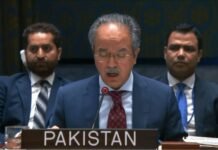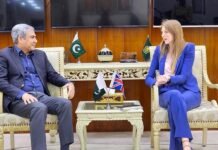New York, 14 July 2022 (TDI): The statement of the United Arab Emirate (UAE) at the UN Security Council (UNSC) was delivered by the Permanent Representative of UAE at UNSC, Lana Nusseibeh on 12 July 2022.
Strategic communications are a key component of peace operations.
At #UNSC, #UAExUNSC emphasized how strategic comms can help:
➡️Missions better communicate with host communities
➡️Counter the effects of mis- & dis-information
➡️Deliver mission mandateshttps://t.co/vHSDTcSe9b— UAE Mission to the UN (@UAEMissionToUN) July 12, 2022
She started off by thanking Brazil for organizing the open debate on the important and innovative topic of strategic communications.
Moreover, she also thanked the Secretary-General for his briefing and sharing efforts to integrate strategic communications in all areas of work of the UN.
Likewise, she lauded the excellent briefers Lieutenant General Marcos de Sá Affonso da Costa, the United Nations Organization Stabilization Mission in the Democratic Republic of the Congo (MONUSCO) Force Commander, and Jenna Russo, Director of Research at International Peace Institute (IPI) for their comprehensive briefings.
She further added that strategic communications are undeniably a key component of peacekeeping. When skillfully used, they are a powerful tool that helps connect peace operations with all stakeholders and amplify constructive messages.
Moreover, they address misinformation and disinformation and contribute to the safety and security of UN personnel. Effective strategic communications can also enhance information-sharing, which in turn improves the implementation of mandates.
But perhaps the most meaningful impact of strategic communications is that they give the opportunity for local communities to directly engage with peacekeeping missions.
Thereby strengthening local ownership of peace efforts, and therefore their sustainability. In these critical ways, strategic communications can maximize the impact of peacekeeping.
So, it is obligatory to keep in mind that developing effective strategic communications in peacekeeping begins with the Security Council.
As the Council members have the responsibility of ensuring that all missions’ mandates outline clear objectives and provide missions with the assets needed to develop effective strategic communications. In this regard, the UAE highlighted the following elements:
Firstly, the Council has to treat strategic communications not only as an element central to the planning of peacekeeping operations but to the Council’s own work.
Efforts to adapt Council messaging to local contexts and make sure that it is understood clearly can significantly improve the Council’s ability to bring about positive change on the issues on its agenda.
Along with this, press statements and Council outcomes, particularly those responding to local dynamics, should be systematically translated into local languages.
Secondly, the Council and the UN should address the pernicious effects of disinformation and misinformation campaigns against peace operations.
The targeting of UN peacekeepers does not happen in a vacuum and it is not just the result of the actions of terrorist groups.
It is often the direct result of a hostile environment that spreads misinformation and disinformation about peacekeeping missions.
Troops and police-contributing countries are making important sacrifices to deliver mandates. It is UNSC’s responsibility to ensure their protection.
Thirdly, peacekeeping requires strong collaboration with the communities they serve to achieve effective outcomes.
Two-way communication is essential to ensure that missions are not simply sharing information with local communities but also being informed by them.
To this end, the Council must ensure that peacekeeping personnel are regularly engaging with host governments, local partners, and civil society at large to better understand and tailor peacekeeping approaches to local dynamics and to different audiences.
Additionally, the leadership of peacekeeping missions must integrate strategic communications within their work on mandated tasks such as the protection of civilians, strategies for disarmament, and demobilization and reintegration.
In the same manner, they should support the women, peace and security agenda, or responses to sexual and gender-based violence.
This includes ensuring that accountability is upheld for acts of sexual exploitation and abuse and that peacekeepers are held to the highest standards of accountability by the UN.
The fact that these links are increasingly being established in UN policies and guidance for peace operations, and encourage further efforts on this front, are warmly welcomed by them.
In this process, peacekeeping missions also need to ensure a gender-responsive approach to all strategic communications, for this purpose they can also employ a gender transformative approach through narratives and context-relevant story-telling.
To conclude she added that, strategic communications can help create conditions for a more efficient implementation of peacekeeping mandates.
They can also contribute to a successful transition by minimizing the impact of a mission’s withdrawal. The UAE firmly believes that, when correctly leveraged, strategic communications can act as an enabler for peace.








